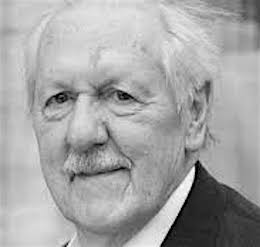We’re saddened to report that we have lost one the greats of science fiction and fantasy. Brian W. Aldiss was 92 years old.
Mr. Aldiss started out as a bookseller, and began his fiction career writing short pieces for a trade journal. Charles Monteith, an editor at Faber and Faber, liked the pieces enough to ask him to write a novel, and his first book, The Brightfount Diaries, was published in 1955. It was a literary story, told in a series of diary entries, about the daily life of a bookseller. However, he had already begun writing stories with a more speculative flavor, being published in Science Fantasy and New Worlds before winning a contest held by The Observer for a short story set in the year 2500, “Not For An Age.” When he told his literary publishers about his genre work, they surprised him by being excited about it, and he eventually edited anthologies of science fiction and fantasy for them.
By the end his books numbered into the hundreds, with over a dozen non-fiction works, including an autobiography titled, Bury My Heart at W.H. Smith’s: A Writing Life; short stories, including “Super-Toys Last All Summer Long,” which became the basis for Stanley Kubrick’s original conception of A.I. Artificial Intelligence, anda Doctor Who story called ”Umwelts for Hire;” and finally his novels, which ranged over a dizzying variety of topics. They include multi-award-winning Helliconia Trilogy, the Hugo-winning Hothouse, about life in a super-tropical rainforest on a dying future Earth, Barefoot in the Head, and experimental work about a messianic Serb whose constantly shifting puns and allusions are an homage of Finnegans Wake; The Eighty Minute Hour, a space opera where the characters actually sing; Brothers of the Head, about conjoined-twin rock stars, which was adapted into a film by Keith Fulton and Lou Pepe, and Jocasta, which re-told Sophocles’ Oedipus Rex and Antigone.
In the early 1960s, he and Harry Harrison founded a journal of science fiction criticism called Strange Horizons, which was the first of its kind. While it only produced two issues, those two issues published work by James Blish and William S. Burroughs, as well as a roundtable discussion between C.S. Lewis, Kingsley Amis, and Aldiss himself. Like many of the great science fiction writers of his generation, he dedicated himself to the genre not only through writing, but also through editing and anthologizing work in an attempt to spread quality speculative fiction. He edited Introducing SF and Best Fantasy Stories for Faber and Faber, a series of anthologies for Penguin, and then some thematic anthologies including Space Opera, Space Odysseys, Galactic Empires, Evil Earths, and Perilous Planets. An artist himself, Aldiss worked on a large format collection, Science Fiction Art, intended to give the great pulp artists the recognition they deserved. He and Harry Harrison also worked on The Year’s Best Science Fiction series for nearly a decade.
Mr. Aldiss was Fellow of the Royal Society of Literature in 1990, a “Permanent Special Guest” at the annual International Conference on the Fantastic in the Arts (ICFA) from 1989 through 2008. He received two Hugo Awards, one Nebula Award, and one John W. Campbell Memorial Award. He was named the 18th Grand Master by the Science Fiction Writers of America in 2000, inducted by the Science Fiction Hall of Fame in 2004, and awarded the title of Officer of the Order of the British Empire (OBE) for services to literature in 2005.
Mr. Aldiss will be greatly missed.










